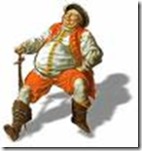Beefy, Compassion and the Road to Meaning
Whilst probably not 500-1 - the odds offered against England winning the 1981 Headlingley test before Botham's heroics - the chances of Ian "Beefy" Botham becoming a knight of the realm must at one time have been rated as pretty slim Even his own autobiography [2000 edition] describes itself as "an intriguing cocktail of sex and drug allegations,personal upheavals [and] confrontations with his peers" - as well as "remarkable achievements both on and off the field"
Today few would deny the merits of Botham's knighthood. Raising over ten million pounds for leukemia-related children's charities far outweighs what are now discounted as minor blemishes. Yet the misdemenours didn't seem so out of character at the time. If you had to compare Botham to a Shakespearian hero, it would surely be that epitome of out-of-control hedonism, Sir John Falstaff. As Michael Henderson wrote back in 2000 :-
Watching [Botham] in his pomp must have been like eavesdropping on Falstaff in an Eastcheap tavern, as he feasted on sack and capons - though even the Lord of Misrule might have struggled to keep up with Botham on a heavy night.
 |  |
I'd wager that Sir John didnt get his knighthood for good deeds. Whilst it's not too much of a stretch to imagine Falstaff flaying opposition bowlers to all parts of the ground like the village blacksmith, I doubt if would have got past the first inn on the John O'Groats-Lands End road. So what started his twentieth-century counterpart on his unlikely trajectory ? One word - compassion. Botham was passing through a hospital ward for some treatment to a broken toe, when he saw some pretty-normal looking children sitting around playing board games. "You know those children won't be here in a few months" commented his medic. They had terminal leukemia, and couldn't expect to see their next Christmas. Botham was so moved he began to donate money for parties for the children, then began doing sponsored walks until eventually he was organising and taking part in mammoth fund-raising events.
Compassion - a feeling of sorrow and pity for someone in trouble - changed the life of Botham himself and the many others helped by him. When Botham visited that Taunton hospital ward, the success rate for treatment leukemia in children was 20%. Now it is 80%. Of course, Botham cannot be held solely responsible for this incredible improvement - but what a legacy!
Buddhists have long argued that compassion isn't just good for other people, it's good for you too.
"If you want others to be happy, practice compassion. If you want to be happy, practice compassion." proclaims the Dalai Lama .
After his knighthood, Sir Ian may agree.
 |  |
So does the mature Sir Ian now resemble the Dalai Lama (above) more than Falstaff? Probably not. I suspect that the Falstaffian side of his character is still very much to the fore. Botham is no saint. But, guided by compassion, he has used his celebrity status to make a huge positive difference to the world. However problematic celebrity is in the modern world, it can be put to good use. Celebrity plus compassion equals meaning. So, what odds will anyone give me about the latest celebrity, Katie from the Apprentice , eventually using her celebrity status to help those in need? Anyone give me 500-1?
Labels: Apprentice, botham, compassion, cricket, dalai lama, meaning, philosophy, practical philosophy, sport and psychology



